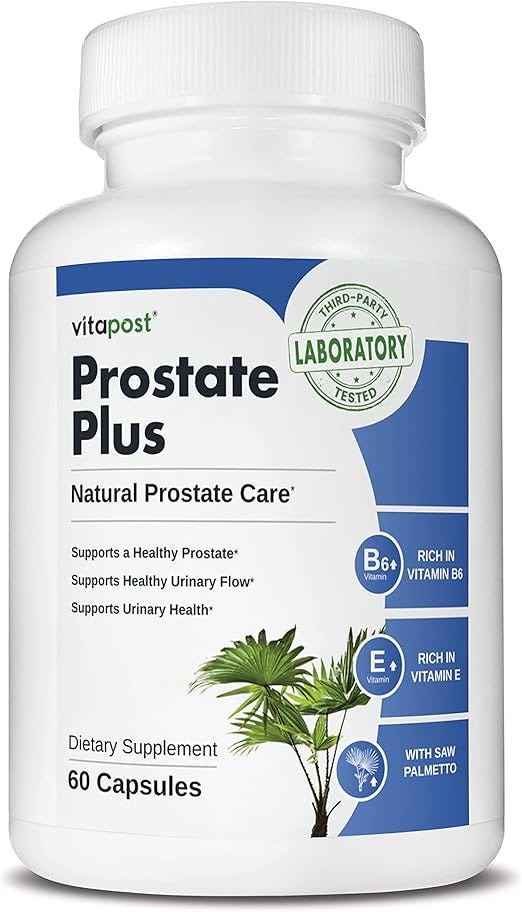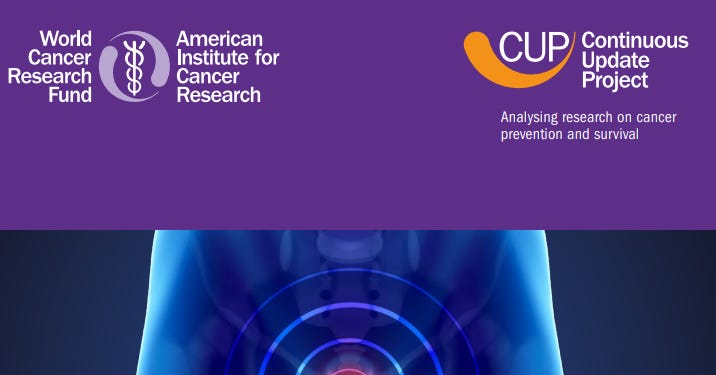5 Proven Habits To Lower Prostate Cancer Risk
Here's the latest research to help you lower your risk of prostate cancer. Evidence-based and reviewed by a physician.
Most prostate news is overshadowed by PSA testing which screens for existing cancer. But I want to help you prevent prostate cancer, in the first place. Backed by large studies, this guide ranks steps that cut your risk in descending order.
The more prostate cancer screening you do, the more likely you are to find a prostate cancer. But few of these slower-type cancers will actually harm the patient. We care most about aggressive and fatal prostate cancers, which is what this article focuses on.
1) Improve Fitness
Research shows: In a Swedish study of 57,652 men, those who improved their fitness were 35% less likely to be diagnosed with prostate cancer. Any level of fitness improvement showed positive results.
What you can do:
Train and ignore any gains. Training itself is more than enough.
Aim for 2-4 weekly sessions that raise your heart rate.
Add 1 strength day. Try air squats.
I’m still unsure as to why exercise lowers your risk of prostate cancer but any amount helps. Other cancers, like colon cancer, also seem to be lower in people who are more active.
2) Keep Calcium And Dairy Moderate
Research shows: Several large studies link higher dairy and very high calcium intake with a small rise in prostate cancer risk. In Adventist Health Study-2, men who drank about 1 ¾ cups of milk a day had about a 25% higher risk than men who had very little dairy.
Plant-based calcium sources do not show the same association. It’s rare for someone in the US and other modern nations to get inadequate calcium.
What you can do:
1 daily serving of dairy is not a problem.
Try non-dairy calcium sources like tofu, beans, greens, and bone-in fish.
Avoid high-dose calcium supplements.
3) Vitamin E & Selenium Supplements May Backfire
What the research shows: A large randomized trial gave men vitamin E, selenium, both, or placebo. Vitamin E at 400 IU a day raised the chance of getting prostate cancer compared to placebo. Selenium did not lower risk.
Most “prostate” blend supplements contain a lot of these. While I don’t believe they are as dangerous as the studies show, I wouldn’t recommend it to my own patients.
Action steps to consider:
Do not use vitamin E or selenium pills to prevent prostate cancer.
Get nutrients from food.
Have more nuts, seeds, fish, grains, avocado, spinach, egg, mushrooms
4) Eat Mostly Plants
What the research says: Big reviews and long-running cohorts point the same way. Diets built on plants, fiber, and olive oil are linked to a small drop in prostate cancer risk, especially for more aggressive disease.
Results are not perfect, but there is a trend that stands out. Heavy animal fat and lots of dairy seem to increase the risk of aggressive prostate cancer.
What you can do:
Make half your plate vegetables. Split the next quarter between beans, lentils and whole grains.
Use olive oil as your main fat. Consider fish as a source of protein. Keep meats low and processed meat very low.
Aim for 30 grams of fiber daily. Include cooked tomato dishes with olive oil once a week.
5) Keep Waist Under Half Your Height
Excess body fat is strongly tied to advanced prostate cancer. The World Cancer Research Fund and AICR estimates that about 1 in 9 advanced cases could be prevented by staying at a healthy weight.
Heavier men tend to die more from prostate cancer than their counterparts with more ideal body compositions. This tells us that excess visceral fat might be the cause of more aggressive prostate cancer.
Waist size is a better predictor than your scale alone. The NHS advices to keep your waist under half your height. For example, if you are 70 inches tall, aim for a waist under 35 inches.
What you can try:
Measure your waist at the belly button, relaxed. Divide by your height. Aim for < 0.5.
Train for small, steady loss if you are over that mark, about 0.5 to 1 pound per week.
Keep lean protein & fiber high at each meal.
Recheck waist & weight and definitely celebrate any move in the right direction.
Bonus: 3 Theories Under Investigation
A) Higher Ejaculatory Frequency
Observational studies suggest men with higher lifetime ejaculatory frequency have lower total incidence. Mechanism is still uncertain. Risk low - pleasure high.
B) Coffee
Several meta-analyses report a small inverse association between higher coffee intake and prostate cancer risk, but findings are mixed and effect sizes are modest. If you don’t drink, no need to start. If you drink, enjoy.
C) Lycopene-Rich Foods
Evidence is inconsistent, with some analyses suggesting lycopene-rich foods protect against prostate cancer. Tomato-rich meals are an example. Especially cooked tomatoes with olive oil, as part of a plant-based pattern rather than supplements.
7-Day Starter Plan
Day 1: Gentle 20 minutes circuit-style calisthenics.
Day 2: Plant-forward dinner, beans & greens.
Day 3: Strength session, push, pull, legs, core, 30 minutes.
Day 4: Enjoyable 30-minute walk.
Day 5: Calisthenics, again.
Day 6: Batch-cook tomato-olive oil sauce, add to 2 meals this week.
Day 7: Measure waist and plan your fitness plan for the next 2 weeks.
Mini-FAQ
Do I need zero dairy?
No. If no cardiovascular disease risk, aim for moderate intake and an overall plant-forward pattern.
Which supplement helps?
None have been proven to help with prevention.
How much exercise is considered enough?
Aim for being active most days of the week. Then focus on improving your fitness for better strength, mobility, agility, and stability.
Should I lose weight fast?
No. Slow, steady changes are easier to maintain. In fact, rapid weight loss causes rebound rather quickly.
Have I done a lot of damage already?
Unlikely. The biggest risk factor of all is age - well, being a male - but then it’s age. It’s never too late to improve your risk.
But I heard that […] helps with prostate cancer prevention.
It’s possible that […] helps but I didn’t find anything else in my research that was convincing. If the risk of trying whatever that might be, it may be worth trying if your risk is high enough.
Prostate Cancer Sanity Check
Due to massive screening in the US and other parts of the world total case counts are inflated. We diagnose a lot of prostate cancer that likely would never kill us - we call them turtles.
So many nutrition papers on incidence are what I consider ‘noise’. The ‘signal’ (what we really want) is clearest for advanced or lethal prostate cancer cases and for outcomes like mortality, where weight & fitness matter most.
Finally, genetic causal analyses (very solid research) points to circulating IGF-1 and related pathways as contributors to prostate cancer risk. This strengthens the case for proper sleep, enough activity, fiber-rich diet, and weight control to keep insulin and IGF-1 balanced.
Public-Health Guidance Worldwide
NHS and Prostate Cancer UK recommend healthy weight, regular activity, and balanced diet to help reduce the chance of aggressive prostate cancer.
US National Cancer Institute list having overweight, inactivity, and smoking as modifiable factors to address many cancers. include prostate cancer.
World Cancer Research Fund/AICR finds strong evidence that excess body fat increases risk of advanced/fatal prostate cancer.
Australia, Cancer Council + PCFA recommend a healthy weight, regular physical activity, and a balanced, plant-leaning diet to lower overall cancer risk.
Singapore, HealthHub + Singapore Cancer Society advise a healthy diet and regular activity.
India, ICMR + Ministry of Health (NPCDCS) emphasize broad lifestyle prevention, healthy weight, activity, and diet for noncommunicable diseases.
Looking for guidance to design your own cancer-prevention strategy?
Also Check out:
Disclaimer:
Dr. Mohammad Ashori is a U.S.-trained family medicine physician turned health coach. The content shared here is for education and general guidance only. It is not personal medical advice, diagnosis, or treatment, and it does not create a doctor–patient relationship. Humans are complicated and context matters. Always talk with your own healthcare team before making medical decisions, changing medications, or ignoring symptoms. This information is to help you add more depth to those conversations.







I thought this was an interesting study, phase 2 controlled intervention (with some limitations of course).
https://www.cancertherapyadvisor.com/news/phytochemical-rich-food-probiotic-supplements-appear-to-slow-progression-in-low-risk-prostate-cancer/
This is a strong, practical piece, and I appreciate that you kept it grounded in risk reduction rather than miracle prevention.
A few physician-scientist reflections that make your five levers even more compelling:
1. Weight and insulin resistance matter. The link between obesity, hyperinsulinemia, and more aggressive prostate cancer phenotypes is increasingly consistent. Visceral adiposity isn’t just storage; it’s an endocrine organ influencing inflammation, IGF-1 signaling, and androgen pathways.
2. Exercise isn’t optional here. Cardiorespiratory fitness and resistance training both appear protective, not just through weight control, but via improved insulin sensitivity, reduced chronic inflammation, and potentially favorable effects on tumor microenvironment signaling.
3. Diet quality over single nutrients. Rather than demonizing one food or canonizing another, the most reproducible pattern is Mediterranean-leaning: fiber, plant diversity, omega-3–rich fish, lower ultra-processed load. Lycopene/tomato discussions are interesting, but the dietary architecture matters more than a supplement capsule.
4. Alcohol moderation and sleep. These are often underemphasized. Sleep disruption and heavy alcohol use both affect hormonal balance and systemic inflammation; plausible pathways for risk modulation.
5. Screening nuance. I’m glad you didn’t ignore PSA entirely. The conversation is no longer “screen everyone” or “screen no one,” but shared decision-making based on age, family history, race, baseline PSA trajectory, and personal risk tolerance.
If there’s one meta-message here, it’s this: prostate cancer risk isn’t just a genetics story. It’s also a metabolic health story. And the same habits that protect cardiovascular and brain health likely bend this curve too.
Clear, balanced, and actually actionable, exactly what preventive content should look like!